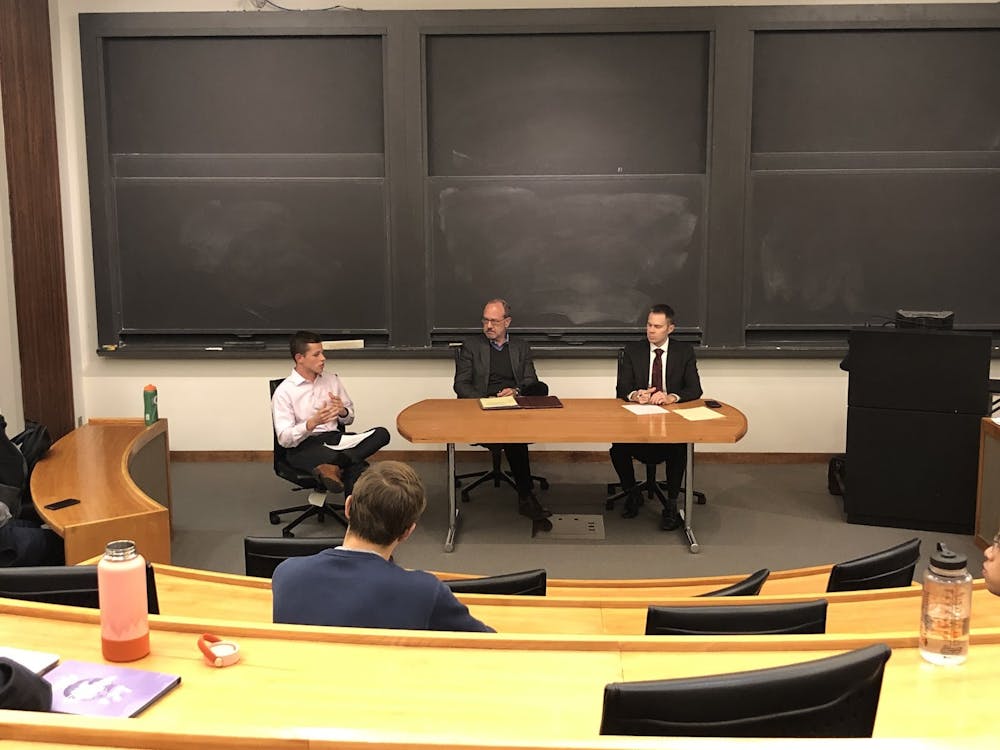On Monday, Nov. 4, professor of politics and international affairs Aaron Friedberg and American Enterprise Institute visiting fellow Michael Mazza discussed China’s policies toward the ongoing Hong Kong protests, as well as the American response.
Michael Mazza specializes in U.S. defense policy, China’s military modernization, and broader Asian grand strategy. Friedberg is an expert on American strategy in East Asia, international relations, and the broader Asia-Pacific region.
Mazza began by explaining the causes of the present violence in Hong Kong. Over the past 22 weeks, residents of Hong Kong have organized ongoing protests across the city, which is governed as a special administrative region. Hong Kong has been under Chinese control since its transfer from the United Kingdom in 1997.
Over the past two decades, Beijing has increased its control over Hong Kong. The current protests began in response to a proposed extradition bill that would allow the Chinese government to arrest and extradite political dissidents in Hong Kong.
Following the massive growth in the number of demonstrators, the protests began to encompass broader issues, such as democratic reforms and retaining autonomy from China. The protests have also escalated due to violence between police and protestors.
“Hong Kong is well on its way to becoming just another Chinese city. Hong Kongers want to prevent that fate,” Mazza said.
Mazza pointed out two possible inflection points in the future. One is Hong Kong’s upcoming district council elections, which could see anti-Beijing parties lose seats in the Legislative Council and legitimacy in the region.
Second, Mazza said that in Taiwan, the anti-Beijing Democratic Progressive Party could potentially regain support it might have otherwise lost due to domestic controversies. Such a development would be a blow to Beijing and Chinese President Xi Jinping, who, according to Mazza, sees both Taiwan and Hong Kong as parts of mainland China that need to be re-unified.
Mazza noted that the United States has responded strongly, with President Trump mentioning Hong Kong to the United Nations and calling for China to respect its treaty guaranteeing Hong Kong’s autonomy. Mazza said, however, that a clear end is not in sight.
Friedberg noted that China has not followed the path that Western countries expected in the 1990s. Rather than industrializing and democratizing, Beijing increased its wealth while adopting a more authoritarian system under Xi Jinping and establishing itself as a power in Asia, putting pressure on the United States.
Friedberg compared the current situation in Hong Kong to the protests in Warsaw, Poland, in 1989. The Soviet Union was then unwilling to commit forces to stop the protests, pressuring Warsaw’s own security forces to respond to protestors.
Friedberg has previously discussed U.S.-Chinese relations in a number of contexts. For example, he participated in the China Policy Debate on behalf of Mitt Romney’s 2012 presidential campaign.

Mazza and Friedberg agreed that the use of the mainland Chinese military to disperse protests was unlikely, as it would result in international condemnation and potentially severe repercussions from the United States in the form of sanctions, visa restrictions, and publicly disclosed statements on the wealth of Chinese elites.
Neither Friedberg or Mazza saw a decisive outcome as likely in the near-term future.
“The best outcome is for the process of Hong Kong’s integration to be deferred and delayed until there is meaningful change in the Chinese mainland’s political structure,” Friedberg stated.
The lecture, entitled “US-China-Hong Kong Relations,” was sponsored by the Alexander Hamilton Society. It was held in Robertson Hall at 4:30 p.m.








